Outbound Links and Their Impact on SEO
Feb 16, 2024
Written by Casey Bjorkdahl

Casey Bjorkdahl is one of the pioneering thought leaders in the SEO community. In 2010, Casey co-founded Vazoola after working for a Digital Marketing Agency for five years in New York City. Vazoola is now one of the fastest growing and most widely recognized SEO marketing firms in the country.
.webp)
In a dynamic world like digital marketing, outbound links emerge as a powerful tool often overlooked in the SEO strategy.
Here at Vazoola, we've learned that these links are more than just digital pathways; they're a testament to the credibility and resourcefulness of your website.
Consider this: A recent study revealed that websites with a balanced profile of outbound links enjoy higher rankings with Google and other search engines.
Why should you care? Because in the vast ocean of online content, standing out requires not just quality content but also strategic connections.
Outbound links can be your compass in navigating the SEO landscape, leading to improved visibility and credibility.
Key Takeaways:
-
Outbound links are essential in SEO, offering a way to improve visibility and credibility by connecting your content to the broader web.
-
A balance between outbound and inbound links is crucial for establishing a website's reputation and boosting its Google search engine ranking.
-
While outbound links are beneficial for SEO, using them excessively can lead to negative consequences, such as diluting content value and potential search engine penalties.
-
The use of outbound links should be strategic, focusing on links that are secure, relevant, enhance user experience, and come from sites with high domain authority and accurate content.
-
Recognizing the qualities of good and bad outbound links is crucial for maintaining the integrity and effectiveness of your SEO strategy.
Table of Contents:
-
What Are Outbound Links?
-
Are Outbound Links Good for SEO?
-
When Should You Use Outbound Links?
-
Can You Have Too Many Outbound Links?
-
How to Use an Outbound Link Strategy
-
Tips and Best Practices for Building Outbound Links for SEO
What Are Outbound Links?
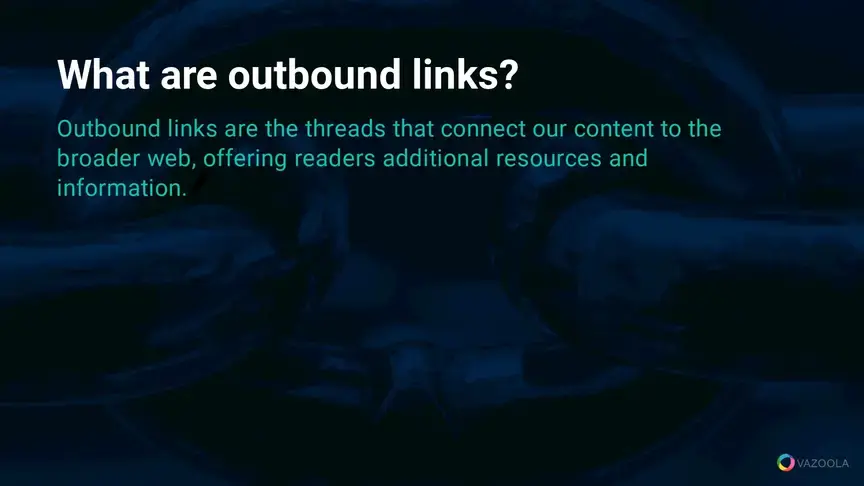
Outbound links are the digital bridges we build from your website to another domain. They are the threads that connect your content to the broader web. The links offer your readers additional resources and refer them to more information.
At Vazoola, we've seen firsthand how these links can enhance the user experience, providing a richer, more informative journey for the reader.
But it's not just about linking to any site; it's about linking to the right sites. To where do you want to refer your audience? Quality, relevance, and trustworthiness are the pillars of effective outbound linking.
These links tell Google and other search engines that we are part of a knowledgeable community, enhancing your authority in the digital space.
Outbound Vs Inbound Links for SEO
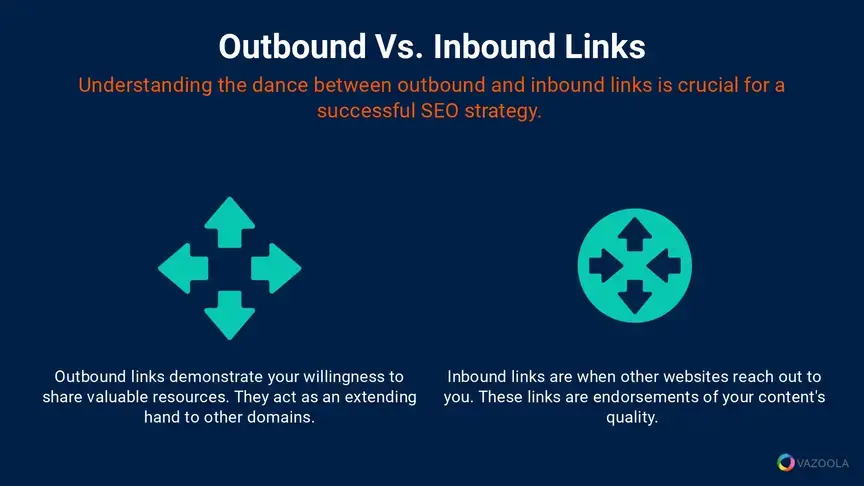
Understanding the dance between outbound and inbound links is crucial for a successful SEO strategy.
While outbound links are like extending a hand to other websites, inbound links are when others reach out to you. Both play pivotal roles in establishing your website's reputation.
In our experience at Vazoola, a harmonious balance between these two types of links can significantly boost a site's Google search engine ranking.
Outbound links give Google and other search engines more context and a clear idea about your content's topic. They demonstrate your willingness to share valuable resources on more than social media platforms like Twitter and LinkedIn, while inbound links are endorsements of your content's quality.
Together, they create a synergy that enhances the overall strength and credibility of your website.
Pro Tips:
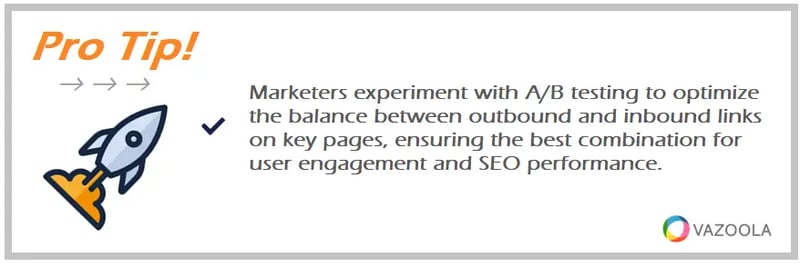
Marketers experiment with A/B testing to optimize the balance between outbound and inbound links on key pages, ensuring the best combination for user engagement and SEO performance.
Internal Vs. External Links for SEO
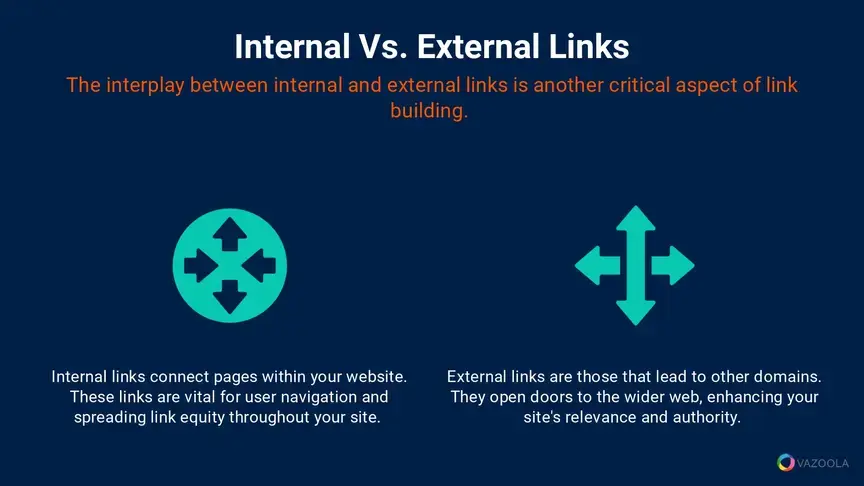
The interplay between internal linking and external hyperlink placements is another critical aspect of link building.
Internal linking connects various pages within your website, weaving a network that guides visitors through your content. These links are vital for user navigation and spreading link equity throughout your site.
On the other hand, external links are those that point to other domains.
At Vazoola, we've learned that a strategic mix of internal and external links can significantly impact your SEO efforts.
While internal links help in establishing website structure and spreading page authority, external links open doors to the wider web, enhancing your site's relevance and authority. Together, they form a cohesive link building strategy that drives both user engagement and Google search engine recognition.
Pro Tips:
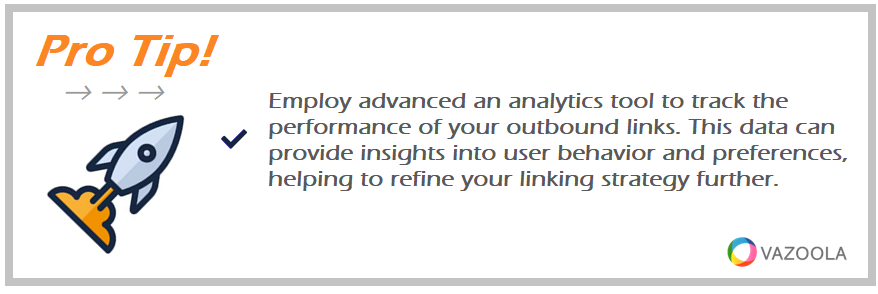
Employ advanced an analytics tool to track the performance of your outbound links. This data can provide insights into user behavior and preferences, helping to refine your linking strategy further.
Are Outbound Links Good For SEO?
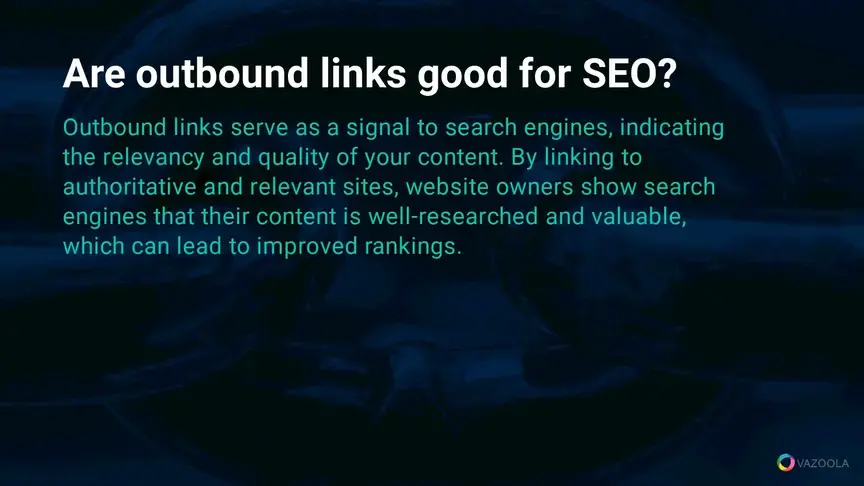
Do outbound links help SEO?
When it comes to SEO benefits, outbound links aren't just good; they're essential.
At Vazoola, experience has taught us that outbound links can significantly enhance a link building campaign and overall SEO strategy.
Statistics support that belief. An SEO.ai study found a correlation between the number of outbound links a website has and its search engine rankings.
Outbound links might not directly impact rankings, but the study indicates they represent the overall effort and quality of top-ranking pages.
Communication from Google also indicates the value of outbound links. In the inaugural Ask Google session in 2019, search advocate John Mueller discussed outbound links:
“Linking to other websites is a great way to provide value to your users," Mueller explained. "Oftentimes, links help users to find out more, to check out your sources, and to better understand how your content is relevant to the questions that they have.”
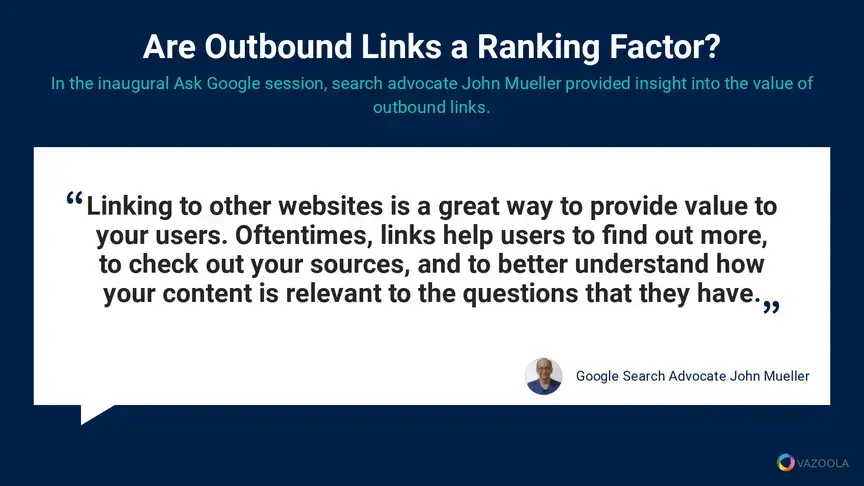
So, how do outbound links provide benefits to SEO performance? They serve as signals to search engines, indicating the relevancy and quality of content.
By building outbound links that point to to authoritative and relevant websites, site owners show search engines that their content is well-researched and valuable, which can lead to improved rankings.
Likewise, outbound links help diversify your link profile, a key factor in SEO success. They are not just pathways that point outward; they are beacons that highlight your commitment to quality and relevance.
Pro Tips:
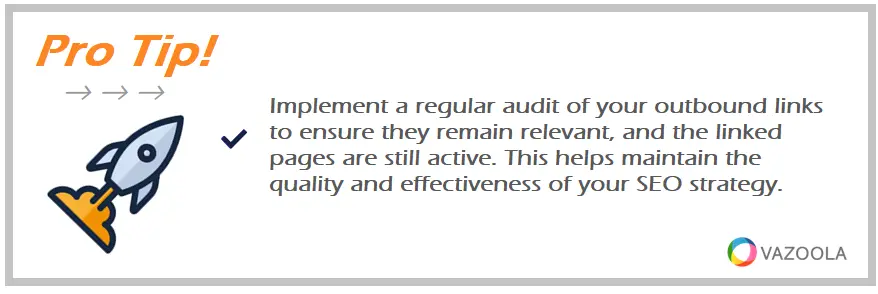
Implement a regular audit of your outbound links to ensure they remain relevant, and the linked pages are still active. This helps maintain the quality and effectiveness of your SEO strategy.
Demonstrate Relevance and Authority
Outbound links are powerful tools for demonstrating relevance and authority in your content. However, just any old external link won't do the trick. Be sure you link to authoritative sites, not just Wikipedia.
By carefully selecting which websites you link to, you align yourself with industry leaders and credible sources in your niche. This alignment not only enhances how your pages provide value, but also positions your website as a knowledgeable player in the field.
At Vazoola, our suggestions involve choosing outbound links that directly relate to the topic at hand and come from reputable sources. The strategy not only improves the user experience but also signals to search engines that your website is a hub of valuable information, thereby boosting your SEO standing.
Boost Click Through Rates
Outbound links can also play a significant role in boosting click-through rates.
By providing links to additional, related information, we encourage users to engage more deeply with your content. This engagement often results in longer visit durations and lower bounce rates, both positive signals to search engines.
Our experience at Vazoola has shown that when users find helpful and related outbound links, they are more likely to trust your site and explore further, leading to increased CTR and overall site performance.
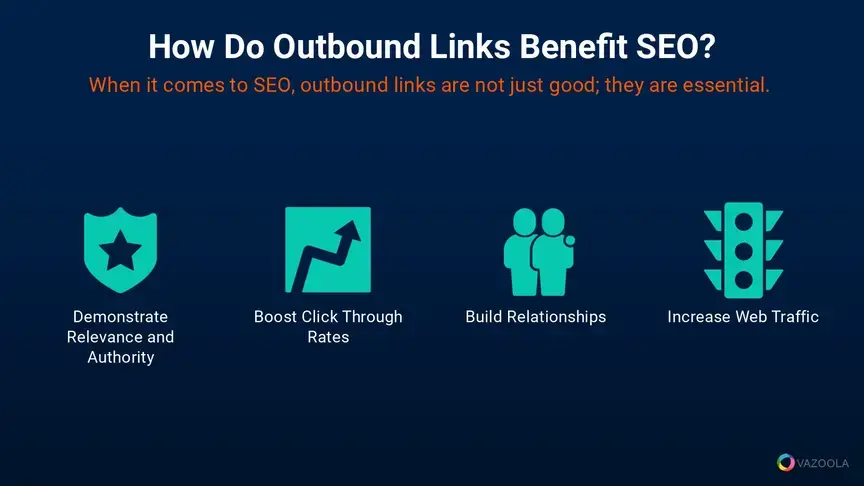
Build Relationships
Building relationships within your niche is another crucial aspect of outbound linking.
When you link to other websites, you open the door to potential collaborations and partnerships. These relationships can lead to reciprocal linking, guest article opportunities, and other collaborative efforts that enhance your website's visibility and credibility.
At Vazoola, we have seen how outbound links can serve as the first step in building a network of mutually beneficial relationships within the digital community, fostering growth and opportunities for all parties involved.
Increase Web Traffic
Finally, outbound links can indirectly lead to an increase in web traffic.
While the primary purpose of these links is guiding users to external resources, they also contribute to the overall SEO health of your website.
Improved SEO often results in higher search engine rankings, which in turn lead to increased visibility and more organic traffic.
As you build relationships through outbound linking, you might gain inbound links from other sites, further enhancing your web traffic.
At Vazoola, we've learned that a well-executed outbound linking strategy can be a significant driver of increased web traffic and overall online success.
Pro Tips:
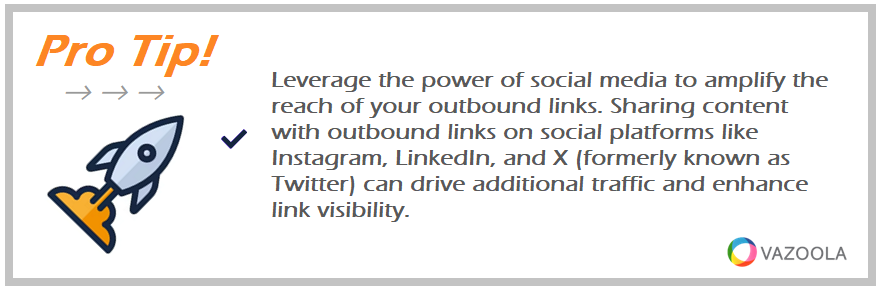
Leverage the power of social media to amplify the reach of your outbound links. Sharing content with outbound links on social platforms like Instagram, LinkedIn, and X (formerly known as Twitter) can drive additional traffic and enhance link visibility.
When Should You Use Outbound Links?
Determining when to use outbound links is a critical component of a successful link-building strategy.
At Vazoola, we understand the quality of outbound links can significantly impact SEO and user experience.
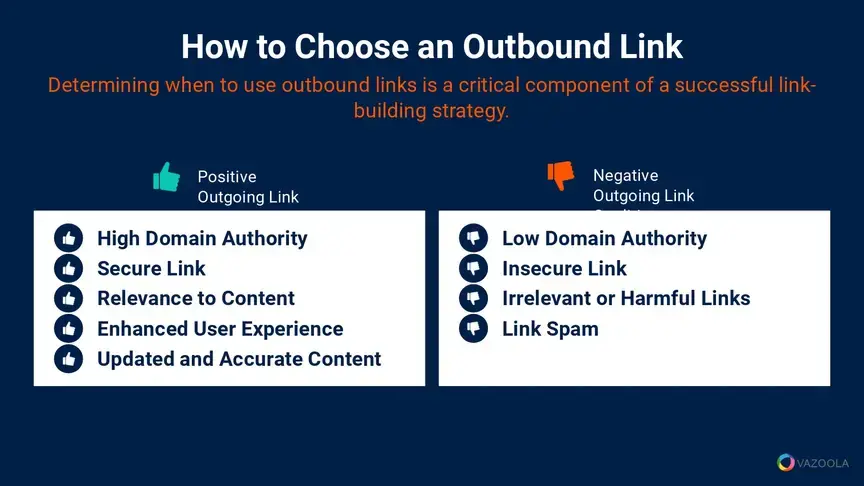
It's essential to recognize the characteristics that make a link beneficial or detrimental to your website. Following are five qualities that optimize an outbound link:
-
High Domain Authority: Links from websites with high domain authority are valuable. They indicate that the site is reputable and trusted, which can enhance your site's credibility.
-
Security: Secure links, indicated by HTTPS, are essential for user trust and safety. They show that the linked site is secure and reliable.
-
Relevance: The link should be directly relevant to the content of your page. Relevant links provide additional value to your readers and improve the overall quality of your content.
-
Enhanced User Experience: A good outbound link should enhance the user experience by providing additional, useful information or resources related to your content.
-
Timeliness and Accuracy: Link to sites with updated and accurate content. This ensures that your visitors are getting the most current and correct information.
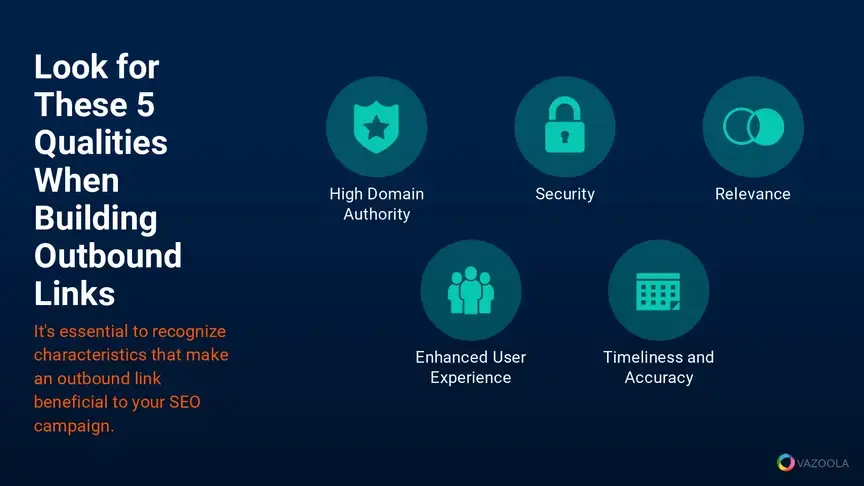
Conversely, certain qualities can indicate a bad outbound link. It's crucial to avoid linking to certain sites to maintain the integrity and effectiveness of your SEO strategy.
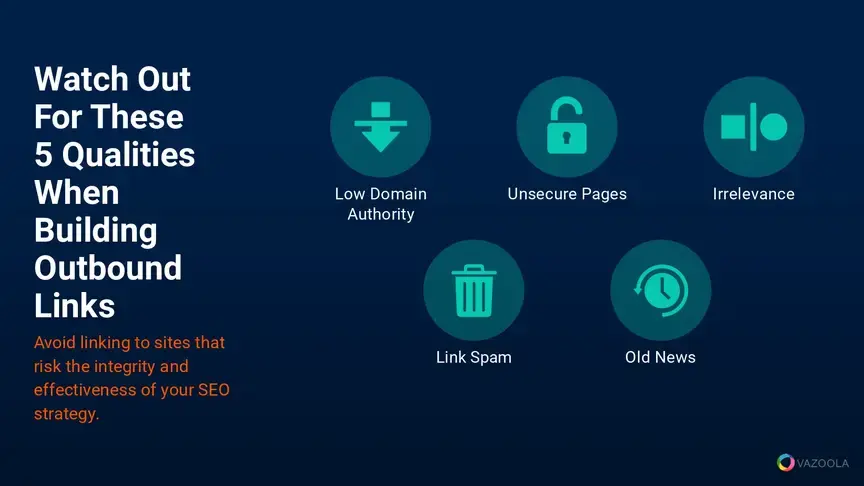
Before you start linking to external sources, keep the following negative traits in mind:
-
Low Domain Authority: Links to sites with low domain authority can harm your site's reputation and SEO performance.
-
Security Risks: Non-HTTPS links can pose security risks to users and reflect poorly on your site's credibility.
-
Irrelevance: Linking to pages that aren't relevant to your content or that lead to harmful sites can damage your site's trustworthiness and user experience.
-
Link Spam: Avoid links that appear spammy or manipulative, as these can lead to penalties from search engines and degrade your site's quality.
-
Old News: Sites with out-of-date information don't offer additional value and won't do much to advance your link building campaign. On the same note, make sure your existing outbound links are still valid, as dead links can harm your SEO efforts.
Pro Tips:
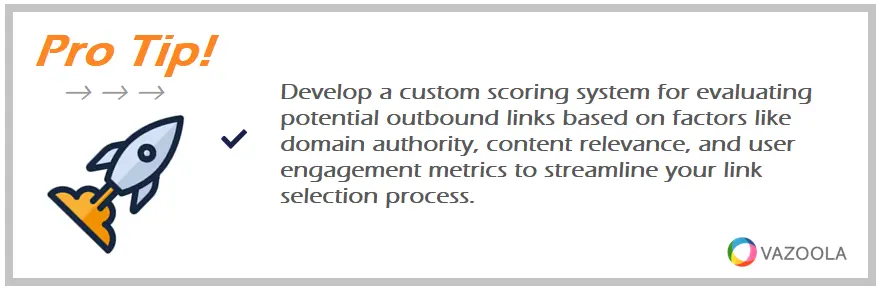
Develop a custom scoring system for evaluating potential outbound links based on factors like domain authority, content relevance, and user engagement metrics to streamline your link selection process.
Can You Have Too Many Outbound Links?
When it comes to outbound links, there is indeed such a thing as too much of a good thing.
At Vazoola, our experience has shown that while outbound links are beneficial, overdoing them can lead to negative consequences.
Excessive outbound linking can reduce SEO benefits, dilute the value of your content and potentially lead users away from your site too frequently, which can increase bounce rates.
More so, search engines may view a page with an unusually high number of outbound links as spammy or of lower quality, which can harm your SEO efforts. Too many outbound links, and websites might be deranked as private blog networks.
How many outbound links are too many? According to Granwehr, top-ranking site examples boast on average between 56 and 171 outbound links.
The key is balance and relevance. We recommend focusing on the quality of links rather than their quantity.
Each outbound link should add value to the content and be relevant to the topic at hand. This approach ensures that your content remains focused and valuable, both to your readers and to search engines.
At Vazoola, we've learned that a well-thought-out outbound linking strategy, one that prioritizes quality and relevance, is far more effective than simply adding links for the sake of it.
Furthermore, recognize the importance to check outbound links' destinations. Linking to reputable, authoritative sites can enhance your content's credibility, while linking to questionable sources can have the opposite effect.
Always strive to link to sites that provide accurate, trustworthy information, thereby reinforcing your own site's reliability and authority.
Pro Tips:
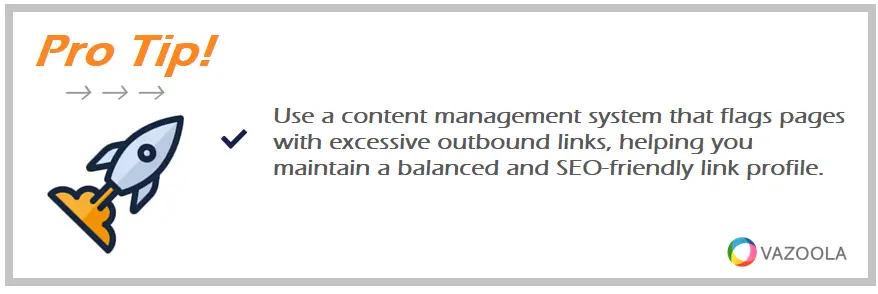
Use a content management system that flags pages with excessive outbound links, helping you maintain a balanced and SEO-friendly link profile.
How to Use an Outbound Link Strategy
Developing an effective outbound link strategy is a crucial aspect of SEO that can significantly enhance a website's performance.
At Vazoola, we've learned that a well-planned outbound link strategy not only improves SEO but also adds value to the user experience. The key lies in being intentional and strategic about where and how we link to external content.
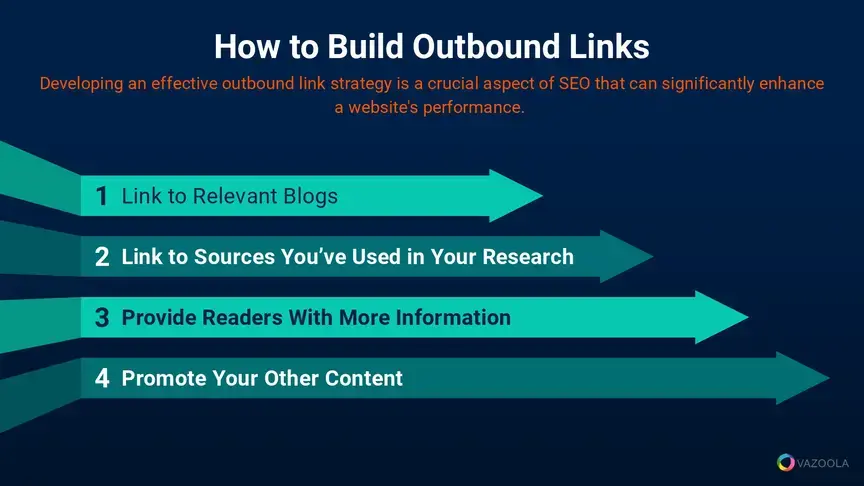
1. Link to Relevant Blogs
One effective way to implement an outbound link strategy is by linking to relevant blogs.
The approach involves identifying a blog post that is not only pertinent to your blog, but also respected and authoritative in its niche.
By linking to these blogs, you provide your readers with additional, valuable perspectives and insights. This practice not only enriches your content but also positions your site as a hub of comprehensive information.
Likewise, linking to a blog post fosters relationships with other bloggers, which can lead to beneficial collaborations and reciprocal blog linking.
2. Link to Sources You’ve Used in Your Research
Another important aspect of an outbound link strategy is linking to sources used in your research.
The practice adds credibility to your content, as it shows that your assertions are backed by research and facts. It also provides readers with the opportunity to delve deeper into the topics we discuss.
At Vazoola, we ensure that the sources we link to are credible and authoritative, reinforcing the trustworthiness of our own content.
3. Provide Readers With More Information
Providing readers with more information is another key element of an outbound link strategy.
The process involves linking to external content that offers additional details, explanations, or viewpoints related to the topic at hand.
Such links can enhance the reader's understanding and engagement with your content.
We focus on linking to sources that complement and expand upon our content, thereby creating a more comprehensive and informative experience for our readers.
4. Promote Your Other Content
Finally, an effective outbound link strategy can include promoting your other content.
If you're already blogging, this promotion involves internally linking to other relevant articles or pages within your own website. The practice not only keeps readers engaged with your content but also helps distribute page authority across your site.
It's a strategic way of guiding readers through a journey of related topics, increasing the time they spend on your site and reinforcing the interconnectedness of your content.
Pro Tips:
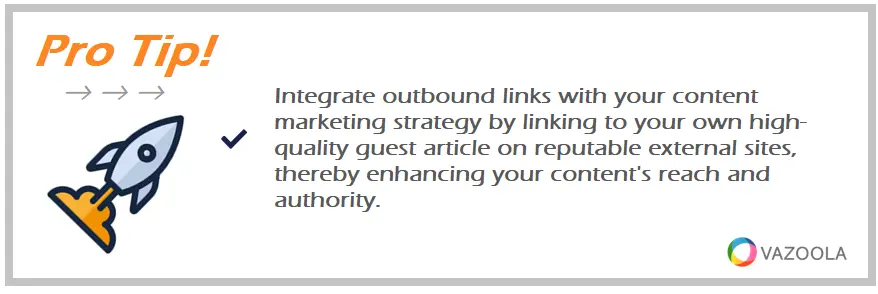
Integrate outbound links with your content marketing strategy by linking to your own high-quality guest article on reputable external sites, thereby enhancing your content's reach and authority.
Tips and Best Practices for Building Outbound Links for SEO
In the world of SEO, building outbound links is an art that requires both skill and strategy.
At Vazoola, we have honed this art through years of experience, learning what works best in different scenarios. Implementing best practices for outbound links can significantly enhance a website's SEO performance. There is definitely a right way and a wrong way for how to create outbound links.
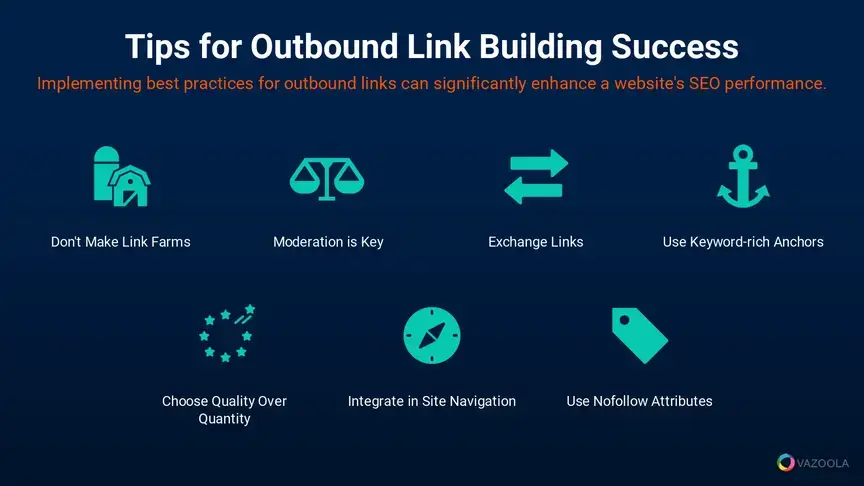
Don't Create Link Farms
One crucial practice is to avoid creating link farms, also known as private blog networks. Link farms are groups of websites that link to each other, usually with low-quality content, primarily to increase their search engine rankings.
The practice is frowned upon by search engines and can lead to penalties. We focus on creating meaningful, valuable links that genuinely contribute to the user experience and the relevancy of our content.
Moderation Is Key
Moderation is another essential aspect of an effective outbound link strategy. Bombarding a page with too many links can overwhelm the reader and dilute the content's value.
We recommend a balanced approach, where outbound links are used judiciously to complement and enhance the content, not overshadow it.
Exchange Links
Exchanging links with other reputable websites can be beneficial. This practice involves linking to other sites in exchange for them linking back to yours.
How common are link exchanges? According to an Ahrefs study, about 74% of the 140,000 websites it evaluated boasted reciprocal links.
It's important to engage in link exchanges with websites that are relevant and authoritative. This not only boosts SEO but also helps in building relationships within the digital community.
Use Keyword-Rich Anchor Text
Using keyword-rich anchor text for outbound links is a practice we have found to be particularly effective. Anchor text is the clickable text in a hyperlink.
By using keywords relevant to the linked content, you can improve the link's SEO value and provide clearer context to both users and search engines.
Choose Quality Over Quantity
Choosing quality over quantity is a fundamental principle in outbound linking. We prioritize linking to high-quality, authoritative sites.
Quality links are more beneficial for SEO than a large number of low-quality links. They enhance the credibility of your site and provide even more value to your readers.
Use Outbound Links in Your Site Navigation
Integrating outbound links into site navigation and throughout content is a strategy that can improve user experience and SEO.
These links should be relevant and add value, guiding users to useful information and resources.
Use Nofollow Attributes
Finally, using rel="nofollow", rel="sponsored", or rel="ugc" attributes in outbound links - when appropriate - bears importance in certain contexts.
These attributes tell search engines not to pass on link equity to the linked site. They are particularly useful for links that are advertisements, paid endorsements, or user-generated content, ensuring compliance with search engine guidelines.
On the other hand, these attributes aren't always the best option for outbound links. Think twice before adding them to links pointing to high-quality pages, including authoritative and relevant sources.
What Is CheiRank?
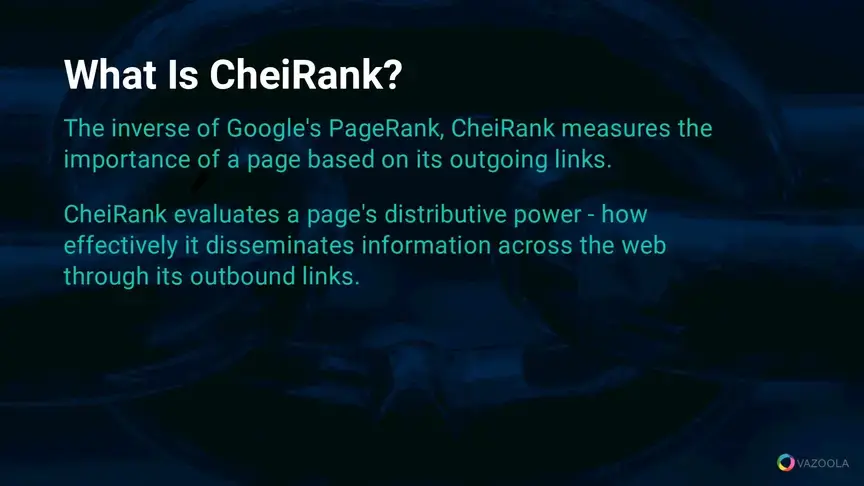
CheiRank is a specialized metric in SEO, focusing on a website's outbound links.
Unlike Google PageRank, which assesses the significance of a webpage based on inbound links, CheiRank measures a page's distributive power - how effectively it disseminates information across the web through its outbound links.
A high CheiRank signifies a page is a key distributor of information, linking users to other valuable resources and sites. The metric is particularly useful for analyzing and enhancing outbound link strategies, offering insights into how these links contribute to the broader digital ecosystem.
CheiRank involves analyzing the network of outbound links from a webpage, and considering both the quantity and quality of these links. The algorithm looks at how a page connects to other authoritative and relevant pages, with a focus on the interconnectedness of the entire link network.
While CheiRank is not commonly featured in standard SEO tools, advanced platforms like Ahrefs, Majestic, or Moz can be employed to gain similar insights by examining a site's outbound link profile.
CheiRank is the inverse of PageRank. PageRank is how much PR the page is getting, Chei Rank is how much it's giving away. Lowering CR automatically increase PR and in turn you rank better in Google. You can learn about CheiRank in a guide by @Kevin_Indig https://t.co/u175CD4dAq
— Nikola Roza (@NikolaRoza) April 5, 2023
Master the Art of Outbound Link Building
Mastering the art of outbound linking is not just a skill but a necessity for digital success.
At Vazoola, we've traversed this terrain, learning that outbound links are more than mere digital pathways; they are the threads that weave the tapestry of the internet, connecting knowledge, people, and businesses.
As you embark on refining your outbound link strategy, remember that each link you create is a reflection of your commitment to quality and relevance.
Embrace the opportunity to not only enhance your SEO but also contribute to the vast, interconnected web of information.
Let your links be the bridges that not only lead others to valuable destinations but also guide them back to you, enriched and enlightened.
At a time when every click matters, make your outbound links count. They are not just pathways to others' domains; they are the milestones of your journey towards digital excellence.

